When asked recently to put together a list or compilation of last year’s best film scores, I found myself in something of a moral dilemma. As a lifelong movie lover from age four, and score enthusiast from age 12, I couldn’t recall a single individual original score or grouping of scores that had captured either my attention or imagination over the past twelve months. It isn’t as though today’s film composers are incapable of writing a memorable melodic score. I utterly refuse to accept that premise. It’s simply that they’re being told not to write a melodic structure or theme. I’ve heard from a number of prominent film composers, music producers and agents that film producers and directors have implicitly instructed composers seeking active employment in film to compose bland, uninspired music for their films so that the visual imagery on the screen will not in any way be supplanted or overshadowed by the accompanying music on the soundtrack. In Hollywood’s golden age, composers like Miklos Rozsa, Bernard Herrmann, Alfred Newman, Dimitri Tiomkin, Franz Waxman, Erich Wolfgang Korngold, Max Steiner, Victor Young, and Hugo Friedhofer were encouraged to write the most glorious music that they could either imagine or conceive. Later, in Hollywood’s silver age of film music, composers like Elmer Bernstein, Andre Previn, Ernest Gold, John Barry, and Henry Mancini were inspired to do the same.
Alfred Hitchcock, under pressure from Lew Wasserman and Universal, began turning the tides of tradition by demanding that Bernard Herrmann, known for decades as a brilliant serious composer, write pop tunes in order to sell records for the studio’s music arm. It was perhaps the subtle beginning of the end for the composing of serious classical music scores in Hollywood and around the world. While traditionalists such as Rozsa, Herrmann, and Elmer Bernstein continued to write great music for the screen, their value as musicians was diminishing in the eyes of younger film makers, and their assignments growing significantly less bountiful.
The tides of artistry turned once more, however, in the mid nineteen seventies when composers like Jerry Goldsmith, James Horner, Ennio Morricone, James Newton Howard, and, in particular, John Williams established new levels of creative brilliance and artistry with some of the most profoundly beautiful music for the movies in the noble history of the genre. And, while studio executives continue, outwardly at east, to praise and admire the work of such older composers, the tides are clearly returning to the day of homogenized film scores, comprising nondescript thematic and simplistic structure, with each new score virtually indistinguishable from the last. Composers are being instructed to write minimalistic music containing no individuality or identifying personality, lest their assignments be given to another musician who will do quite simply what he or she has been told in order to continue working in the film community and earning a paycheck.
Not wishing, however, to decline an invitation to write about the music that I adore, I suggested that we concentrate, then, on new recordings or improved restorations of older, existing scores by composers unrestricted by the reigning political climate within the film community whose talent and imagination was permitted to soar … to a time when motion picture music was respected as a joyous and ever evolving art form unto itself.
The ongoing restoration of classic film music has been championed in recent years by a handful of respected labels whose work and productivity has been, and must continue to be, both encouraged, patronized and respected. These small labels include Intrada, FSM (now retired), La-La Land, Varese Sarabande, Kritzerland, Quartet, and Silva, among others. Their work over the past year has been admirable and, at times, remarkable.
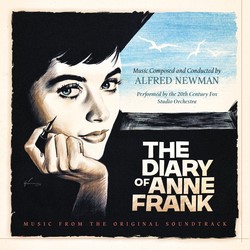
1. Perhaps the most astonishing new restoration and release of the past year became both an historical and deeply significant find. Alfred Newman’s exquisite score for George Stevens’ 1959 20th Century Fox production of THE DIARY OF ANNE FRANK, while released initially in abbreviated form on LP, has been missing in its entirely for sixty years. The touching true story of a young girl’s coming of age, while doomed to die in the Nazi concentration camps, provided the sensitive backdrop for Newman’s haunting score. When asked about its existence, we were led to believe for decades that its original “score” elements had disappeared and were either destroyed or lost forever. Their recovery and ultimate archival restoration had been a nearly sacred journey by musicologists and music preservationists that seemed doomed to failure. Out of nowhere, then, and as a stunning reward for countless years of frustration and failure, comes a welcome two disc release of both the original album, as well as the long missing original score elements by one of the greatest composers of this or any other screen age, the wonderful Alfred Newman. The liner notes for this breathtaking premier release allows us to pay tribute to those who fought for its wondrous restoration …
“Produced by Nick Redman, Mike Matessino and Neil S. Bulk, and restored, mixed and mastered by Chris Malone, from multi-track 35mm magnetic film and a recently located ¼ stereo tape album master, this limited edition release of 2000 units features exclusive, in-depth liner notes by writer Julie Kirgo and classic art direction by Jim Titus.”
Indeed, this long awaited release merits a very special Thank You to the late Nick Redman who was among the first to recognize the value of this sacred quest and score, and pressed forward prior to, and in the midst of his valiant fight for life, to bring its reality to superlative and joyous fruition.
Alfred Newman’s poignant, sensitive, deeply moving score has returned at last in a stunning new release from La-La Land Records that is wholly deserving of support, applause, and recognition for those whose efforts went the proverbial extra mile and returned this symphonic masterpiece to an accessible realm of listening and availability where it belongs,and has always deserved to be.
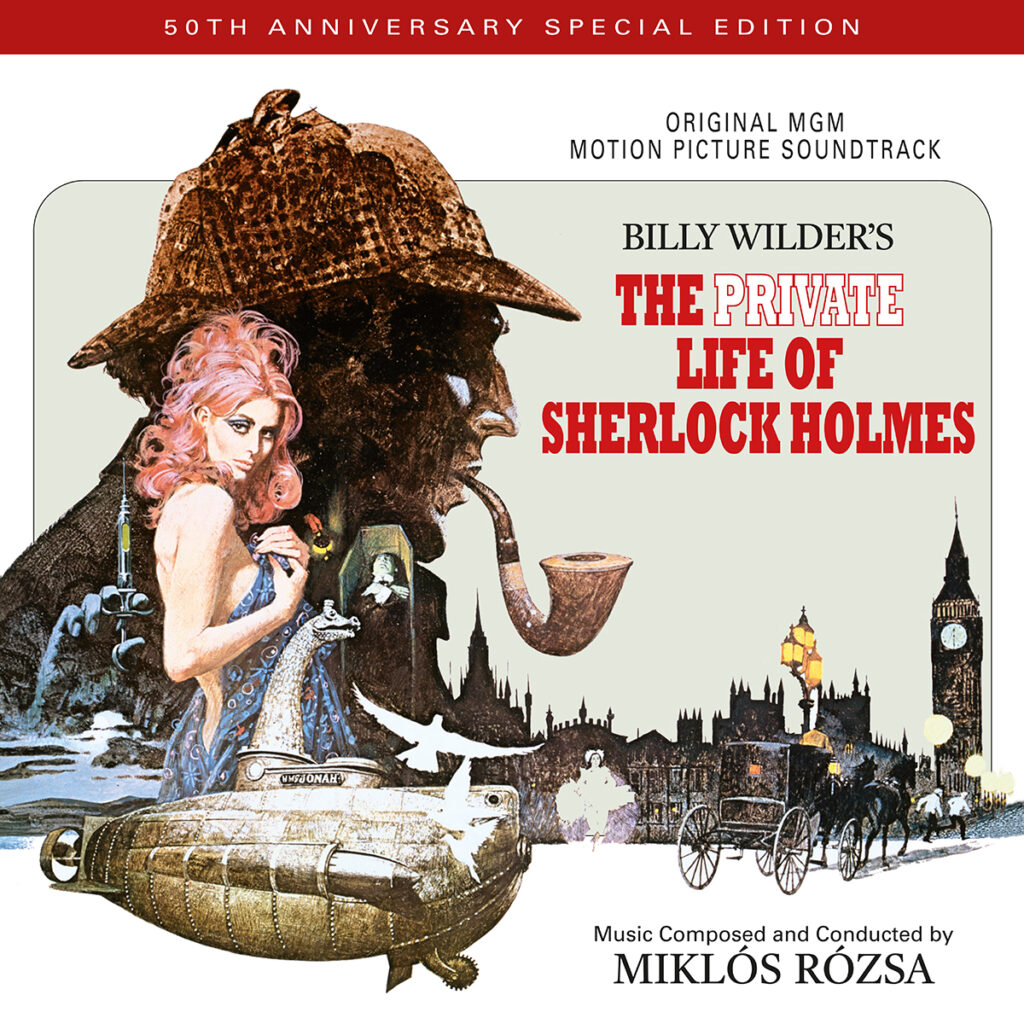
2. Billy Wilder’s sumptuous romantic homage to THE PRIVATE LIFE OF SHERLOCK HOLMES for United Artists in 1970 provided the realization of the director’s dream of at last putting Arthur Conan Doyle’s classic consulting detective on the screen in a deeply personal version of Wilder’s empathy for the character. Filled with tender longing and unexpected loneliness, Robert Stephens portrayal of Holmes, as written and conceived by the director, offered a unique vision of the famed detective whose arrogance and pride allowed for little companionship or vulnerability, other than the assurance of his own singular brilliance. Wilder had fallen in love with Miklos Rozsa’s “Concerto For Violin and Orchestra Opus 24” and often played the recording by Jascha Heifetz in his trailer while working. He had long dreamt of using the concerto in some future project, and found its perfect companion at last in the understated sadness inherent beneath the shadows of genius in “Sherlock Holmes.” Rozsa wrote a rich tapestry of illustrative music to lend support to his own violin concerto, creating a vibrant fabric of impassioned, impeccable scoring with which to tenderly uncover Holmes’ gently hidden layers of personal fragility. It remains a late masterwork in the composer’s cinematic repertoire. Quartet Records, having previously unearthed the original soundtrack sessions of the recorded score, added to the utter magnificence of their previous release by providing hitherto unreleased cues from the score, along with a suite from Rozsa’s legendary Polydor recordings, as well as the complete Heifetz version of the violin concerto on RCA that Wilder had initially fallen in love with, for this new two cd soundtrack recording.
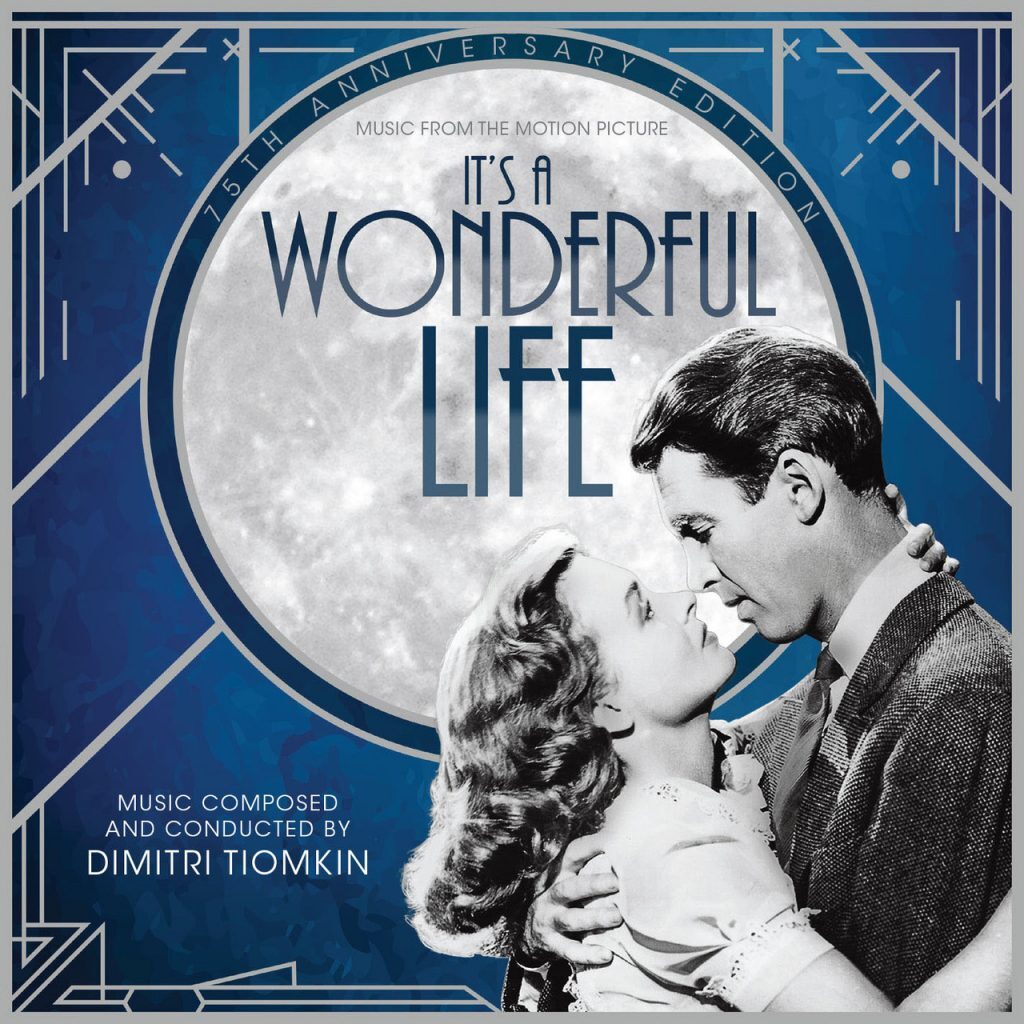
3. IT’S A WONDERFUL LIFE remains director Frank Capra’s most beloved motion picture, and La-La Land Records has delivered a definitive release of Dimitri Tiomkin’s memorable score in a new limited album of two thousand units on their label just in time for Christmas. Tiomkin’s wonder filled music offers both hopeful and inspiring support for George Baily’s (James Stewart) emotional path to spiritual redemption in this classic motion picture and score. Tiomkin, the Oscar winning Russian born composer, has written an endearing and enduring masterwork for this Frank Capra holiday classic, and La-La Land has produced a valued musical recording of a joyous, heartfelt score.
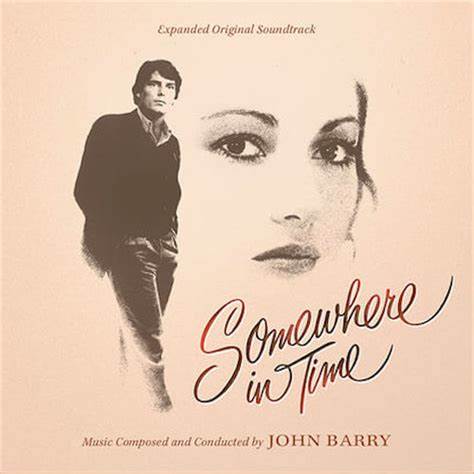
4. Fantasy/Sci-Fi author Richard Matheson wrote the sensitive screenplay for his own story of time travel, “Bid Time Return,” in 1980 for Universal’s beloved production of SOMEWHERE IN TIME starring Christopher Reeve, Jane Seymour, and Christopher Plummer. Written and filmed in the “grand” tradition of cinematic ghost stories such as “The Ghost and Mrs. Muir,” SOMEWHERE IN TIME tells the literally timeless tale of a playwright willing his subconscious mind back to the turn of the century where he meets the younger incarnation of a famous stage actress who, in present time, beseeched him to “come back to me.” A sublime return to story telling of another time and space, Matheson fashioned a poignant love story encompassing generations unbound by physical constraint … a love sonnet bridging the boundaries of imagination with infinite compassion and tenderness. For this fragile journey into a twilight zone of yearning and remembrance, composer John Barry was chosen to write one of the loveliest scores of his incomparable career, restored and expanded by La-La Land for this definitive presentation.
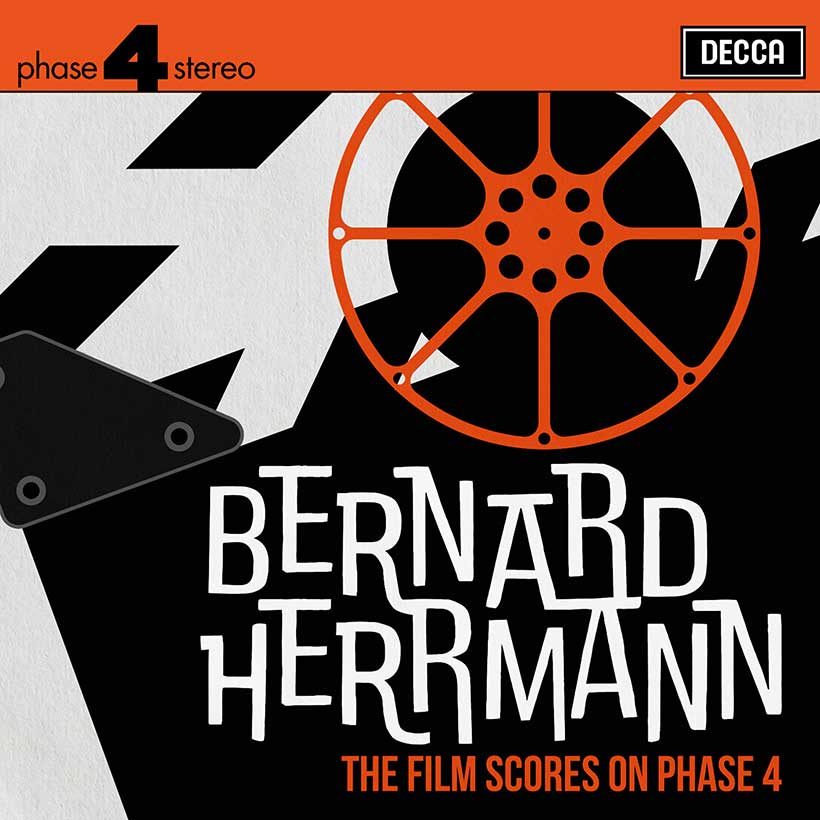
5. Among the great composers of either this or any previous age, Bernard Herrmann was also a renowned and respected symphony conductor. Long the conductor for CBS Radio in the 1940’s, Herrmann’s interpretive gifts championed the works of many unsung heroes of twentieth century composition. He also famously recorded a brilliant series of albums comprising his own substantial compositions for a variety of cinematic genres, preserved in The United States by London Phase 4 Records and, in England, on Decca Phase 4. This distinguished series of recordings highlighted not only by his own creative works, but by the works of other film composers such as Miklos Rozsa and William Walton. The sound and sonics of these historic recordings was groundbreaking for their level of stereophonic clarity, and breathtaking performances. Now, Decca Phase 4 Records has upgraded and improved the sound quality of these original recordings with a superb box set titled, BERNARD HERRMANN: THE FILM SCORES ON PHASE 4, and these remarkable recordings with Bernard Herrmann leading The National Philharmonic Orchestra in England have never sounded better.
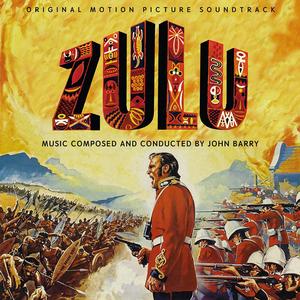
6. For John Barry enthusiasts, of which we are legion, Quartet Records has restored an early Barry gem from 1964, releasing a full stereo soundtrack for ZULU, featuring the composer’s electrifying score in a fully restored cd that is both thrilling and memorable. As was the film that it was written for, the composer’s music is a lush, exciting tribute to the valor and courage of the tribes of both British and Zulu warriors who fought one another with heroism, honor, and ultimate respect.
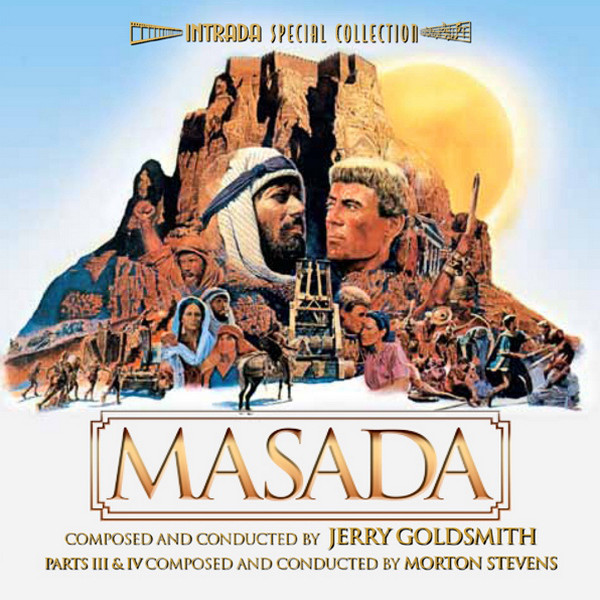
7. Intrada Records has devoted a lavish four cd set of recordings from the original soundtrack of the epic 1981 television miniseries MASADA, recounting the bravery of Jewish patriots defending the mountains of their scarred fortress in 72 AD against the marauding legions of Rome. The massive score, composed by both Jerry Goldsmith and Morton Stevens, has been lavishly restored and preserved in this remarkably expansive recording.
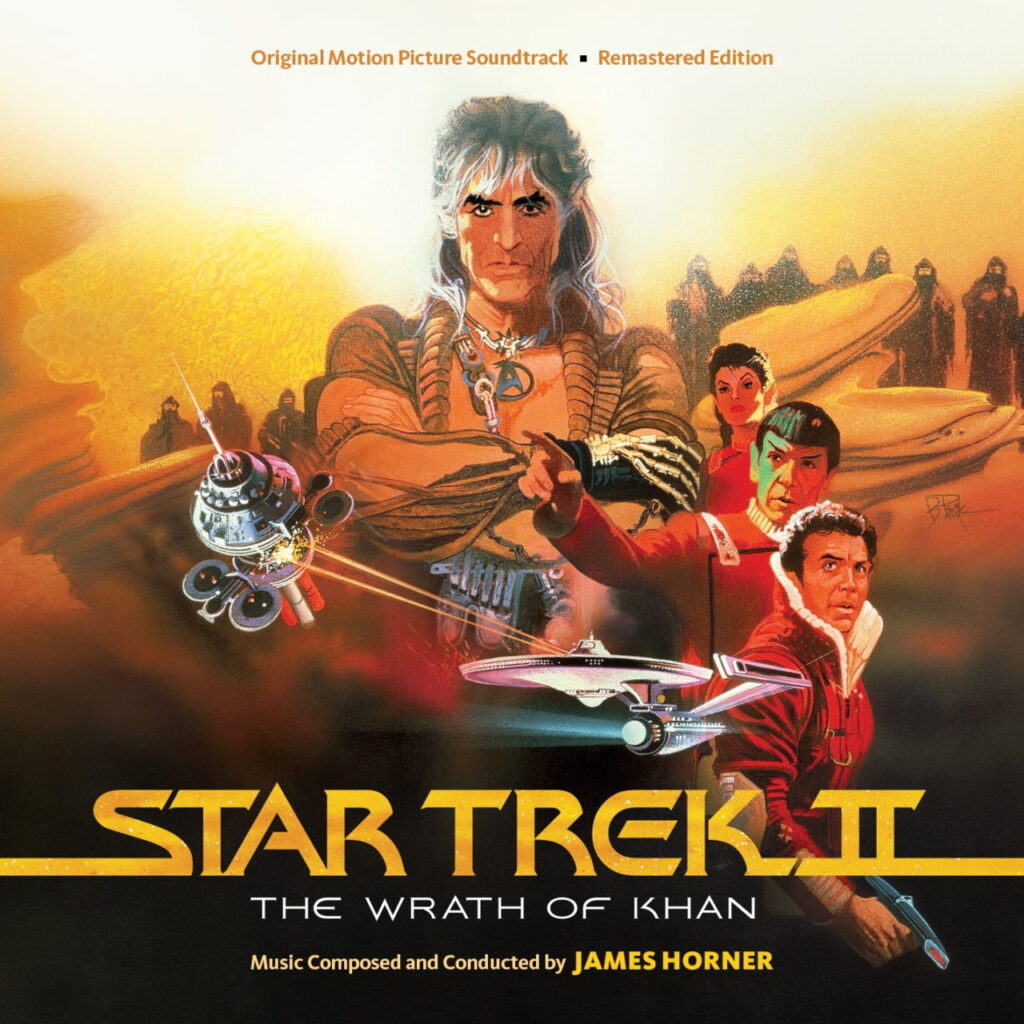
8. Easily the finest of all of the popular STAR TREK movies, Nicholas Meyer’s direction of the second film in the franchise, STAR TREK: THE WRATH OF KHAN, in 1982 revitalized the series with its superb direction, thrilling script, and affectionate ensemble performances by the original television cast including William Shatner, Leonard Nimoy, De Forest Kelly, James Doohan, George Takei, Walter Koenig, and Nichelle Nichols, as well as the great Ricardo Montalban in a remarkable star turn as “Khan.” While Jerry Goldsmith’s definitive themes from the original Robert Wise production in 1979 have proliferated countless screen incarnations and tv spin offs, composer James Horner was recruited to write a fresh new score for the film that would ultimately launch a thousand starships. This staggering symphonic work would similarly launch Horner’s career as a full blown motion picture composer, and became one of his signature scores. La-La Land has reissued this monumental score in a new two cd soundtrack presentation that is at once as exhilarating and triumphant as the landmark Nicholas Meyer motion picture that it was written for
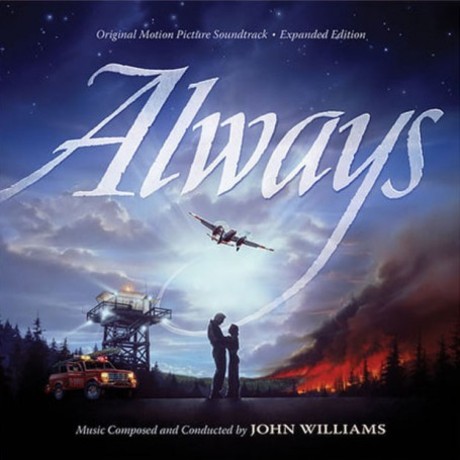
9. Steven Spielberg’s reimagining of the classic World War Two tearjerker “A Guy Named Joe” (1943) starring Spencer Tracy, Irene Dunne, and Van Johnson was a box office disappointment during its initial release in 1989. ALWAYS starred Richard Dreyfuss and Holly Hunter in the roles created by Tracy and Dunne, as well as the radiant Audrey Hepburn in her final screen appearance as the angelic figure or symbol who guides Richard Dreyfuss to his ultimate destiny. While the film failed to garner either critical or audience approval, Hepburn’s star shone ever bright once more before vanishing tragically to Cancer. While largely forgotten as a film, however, the score by John Williams was lovely and appropriately ethereal. La-La Land has done an exemplary and noble job in restoring and releasing this sweet romantic score by the screen’s premier composer.
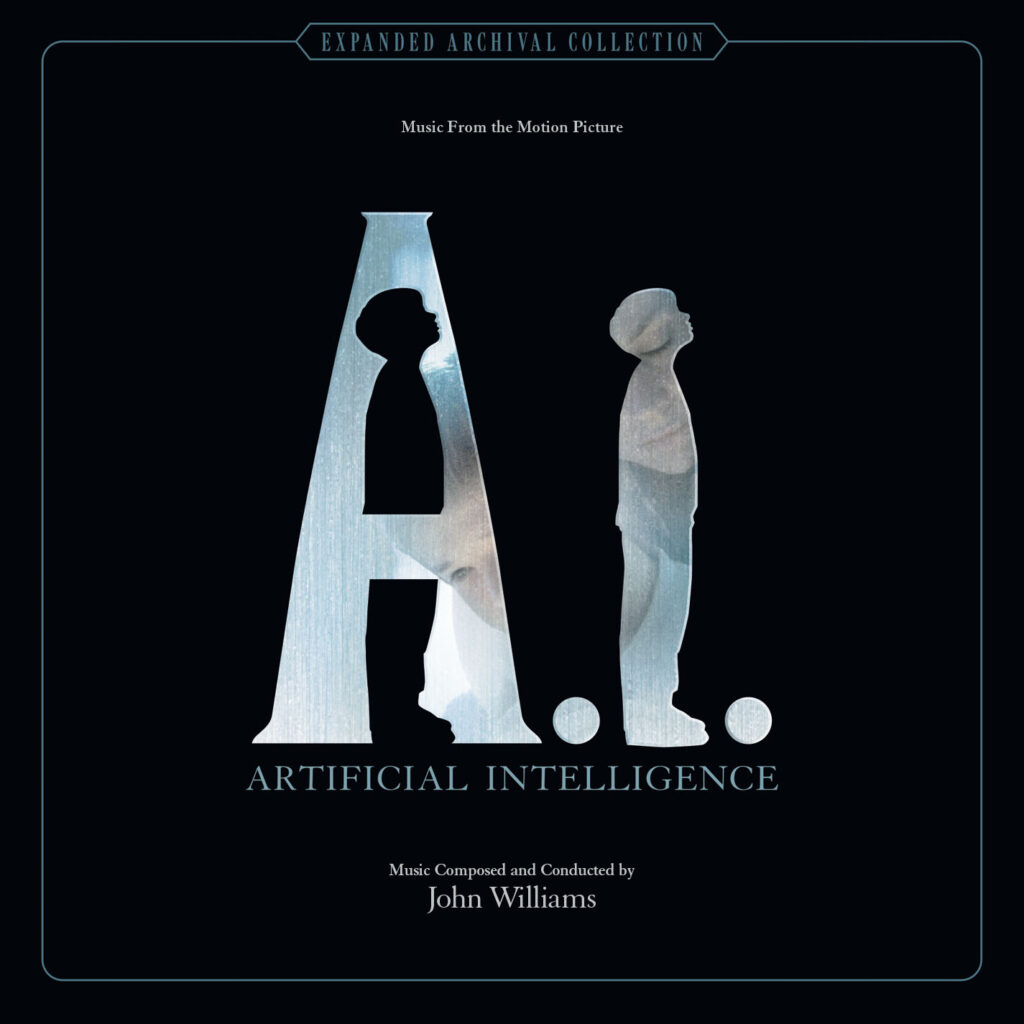
10. Steven Spielberg’s purest, yet most misunderstood and under appreciated cinematic gem would have to be his bittersweet sci-fi fantasy “A.I. ARTIFICIAL INTELLIGENCE from 2001. This melancholy odyssey through space and time was developed by the late Stanley Kubrick, and based upon the 1969 story story “Supertoys Last All Summer Long” by Brian Aldiss. Kubrick decided that the thematic material was, perhaps, too sentimental for his cinematic style, and might be better suited to Steven Spielberg’s artistic sensibilities. Starring Haley Joel Osment as the artificial little boy searching for love, along with Jude Law as his loyal companion, and Frances O’Connor as “Mommy,” A.I. remains, perhaps, the most ambitious and visionary production of Spielberg’s career with a science fiction tapestry sheltering the heart aching story of both lost love and starvation for a single particle or remnant of affection. This haunting tale of redemption, salvation, and humanity features a gorgeous, unforgettable musical accompaniment by John Williams that grows, ever triumphantly, upon the soul. It has been masterfully, and meticulously preserved in an exquisitely beautiful 3 cd restoration by La-La Land Records.
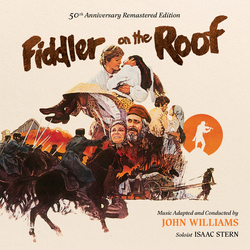
11. While not, strictly speaking, an original film score, La-La Land’s glorious restoration of Jerry Bock and Sheldon Harnick’s blockbuster musical FIDDLER ON THE ROOF, adapted and conducted by John Williams, has been released in a wonderfully comprehensive 3 cd set that captures the beauty, nobility, and historic will to live and to survive by the Jewish people, as well as the cherished “Tradition” of the ever “Wandering Jew.” John Williams won an Oscar for his handling of the score for this 1971 screen adaptation directed by Norman Jewison, and starring Chaim Topol with Norma Crane, while La-La Land has given music lovers one of the greatest gifts and musical treats of 2021.
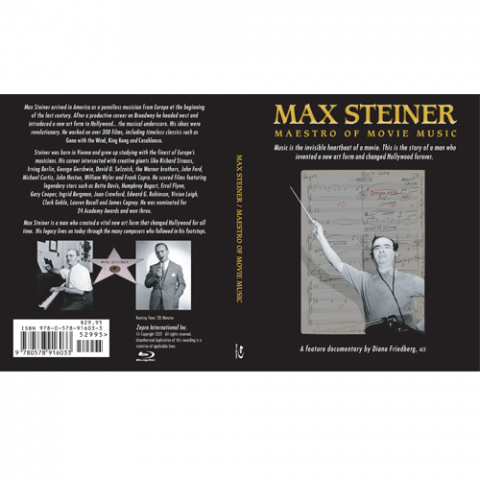
12. Finally …one of the most exciting surprises of the last year was the virtually unheralded release of a full length documentary motion picture based upon the life and astonishingly prolific career of Max Steiner, known affectionately as “The Father of Film Music.” Following on the heels of Steven C. Smith’s landmark biography, this brilliant new motion picture comprehensively captures the turbulent life, and remarkable career of the astonishingly gifted, pioneering composer who quite literally invented the symphonic motion picture score with, perhaps, the first, and most important film score of the sound era, “King Kong” in 1933. His subsequent contributions to the art of cinema and music for the movies include “Gone With The Wind,” “She,” “The Informer,” “Now Voyager,” “Dark Victory,” “The Big Sleep,” “Casablanca,” “Key Largo,” “Tomorrow Is Forever,” “Adventures of Don Juan,” “The Treasure of Sierra Madre,” “The Adventures of Mark Twain,” and “White Heat” in a career that spanned over thirty years, and some three hundred or more original film scores. Directed by award winning documentarian Diana Friedberg, and written by her husband Lionel Friedberg, MAX STEINER: MAESTRO OF MOVIE MUSIC features remarkable, never before seen historical footage, as well as informed participation by Jon Burlingame, Leonard Maltin, Robert Townson, James D’Arc, Ray Faiola, Michael Feinstein, Steven C. Smith, William Stromberg, and John W Morgan. Released by Zepra International Pictures, with a running time of 120 minutes, this remarkable motion picture leads my list of the very best in “Music For The Movies” in 2021.
— edited by Roger Hall
